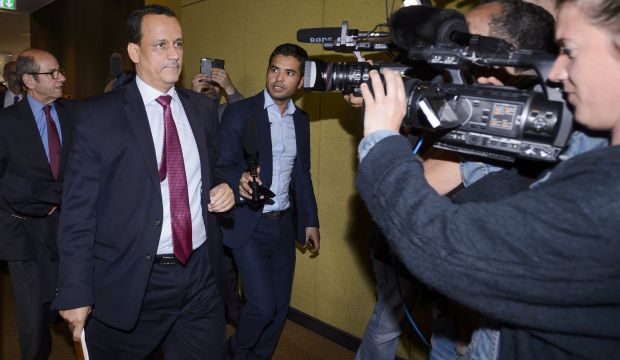
The United Nations Special Envoy to Yemen Ismail Ould Cheikh Ahmed arrives at the Yemeni rebels’ hotel during Yemen peace talks on June 16, 2015 in Geneva. (AFP Photo/Fabrice Coffrini)
Geneva, Asharq Al-Awsat—Last-minute demands by the Houthi movement could threaten to derail peace talks that opened in the Swiss city of Geneva on Monday between Yemen’s internationally recognized government and the rebel group, it has emerged.
The Houthi delegation demanded on Tuesday that UN Envoy to Yemen Ismail Ould Cheikh Ahmed conduct consultations with the two sides in the same meeting room, contrary to a previous agreement that discussions initially start as “proximity” talks leading to bringing the two delegations to the same table.
During an initial meeting with Ould Cheikh Ahmed on Tuesday, the Houthis insisted that they hold talks directly with the government delegation.
The Houthi demand, analysts said, is a reflection of the group’s desire to make the UN-sponsored peace talks appear like a continuation of the National Dialogue Conference, a series of meetings held by Yemeni factions following the removal of ex-president Ali Abdullah Saleh in 2012.
Neither the government nor the UN envoy commented on the Houthi demand.
Another issue, which drew heavy criticism from the government’s delegation, was the size of the Houthi delegation, which exceeded the seven-member limit set by the UN. The Houthi delegation which arrived to Geneva early on Tuesday consisted of 23 members, with 15 flying from Sana’a and eight joining from different European countries.
It is composed of mainly Houthis and members of the Saleh-led General People’s Congress (GPC) party.
The government’s delegation strongly objected to the size of the Houthi delegation, arguing that it was clearly agreed during the preparations for the talks that each delegation would consist of seven members to be accompanied by three advisers.
Ahmed Al-Maysari, a government delegation member, told reporters in Geneva on Tuesday that his delegation would not hold any discussions before they receive a list stating the names of the members of the Houthi delegation.
“We want to know who we will be talking to. If we were to discuss the issue of [Houthi] withdrawal from cities, for example, it would not be very useful to negotiate that with representatives from the Yemeni Socialist Party, the Nasserist party, or the Al-Hirak movement. I need to know that the one I am talking to is someone who wields decision-making powers, someone who has guns and artillery, someone who is capable of enforcing a ceasefire,” he said.
The government delegation, which arrived in Geneva on Sunday, said it was unhappy it had not received the agenda for the talks.
“We need an agenda stating the dates of the official meetings with the other side and with our legal and military advisers,” Maysari said.
Even if the UN Envoy manages to reach a middle ground over the divisive issues, observers predict, other problems could emerge during the consultations, most importantly determining the basis on which the peace talks should be held.
The government delegation insists the Geneva talks be based on UN Security Council Resolution 2216 that calls for the immediate withdrawal of Houthi militants and forces loyal to Saleh from the areas under the Houthis’ control.
Yemen has been in turmoil since last September when Houthi rebels seized state buildings and facilities in the capital Sana’a. The powerful group has since continued to spread across the country.
Hadi fled to Saudi Arabia in March after escaping a Houthi-imposed house arrest. At Hadi’s request, Riyadh launched an aerial campaign against the rebels on March 26, targeting the Houthis and forces loyal to Saleh whom it accuses of facilitating the rebel power-grab.
